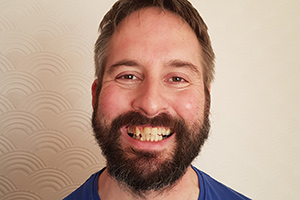Brass Eye: Biting, cutting edge 1990s satire that still resonates today
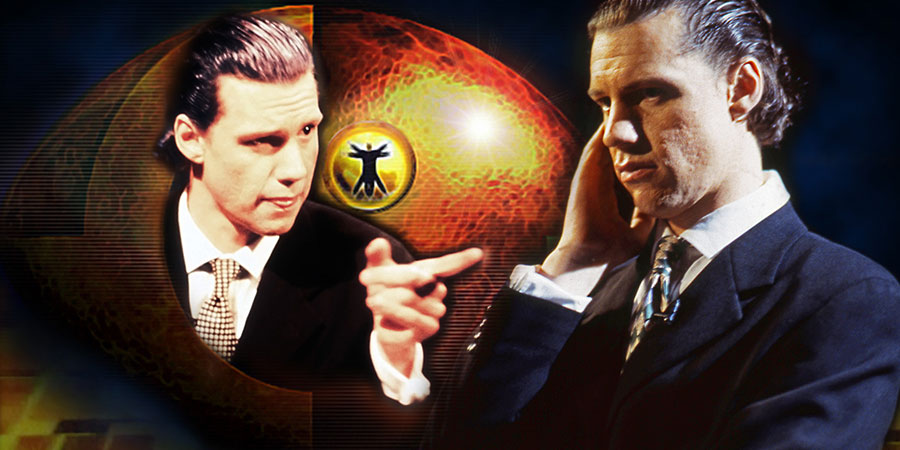
One evening, in early 1997, Channel 4 viewers were warned of the existence of a dangerous new drug which was hitting the streets. And if anyone was in any doubt as to the seriousness of the threat posed by 'Cake', a host of well-known figures were on hand to articulate the true extent of the danger, all backed up with the latest scientific evidence.
"What is cake?" asked Noel Edmonds, "Well, it has an active ingredient which is a dangerous psychoactive compound known as dimesmeric andersonphospate. It stimulates the part of the brain called Shatner's bassoon, and that's the bit of the brain that deals with time perception. So, a second feels like a month."
Edmonds had been a household name for nearly twenty years. He had been the host of Noel's House Party for most of the decade, a Saturday evening TV favourite which included The Gotchas. In the famous feature, he had duped a long list of celebrities - ranging from Will Carling, Jill Dando, Lionel Blair, Carol Vorderman and Barbara Windsor - into making themselves look foolish in front of the camera, but now it was his turn.
It was not just Edmonds, however, talking about Cake on this evening. A number of well-known names were happy to be filmed reading out literally anything they were told to combat the menace posed by the new made-up drug.
Controversial comedian Bernard Manning went further. "Cake is a made-up drug. It's not made from plants, it's made from chemicals... by... sick bastards," Manning was moved to strong language, rarely used on TV at the time. "One young kiddie on Cake cried all the water out of his body," he related. "Just imagine how his mother felt. It's a f***ing disgrace."
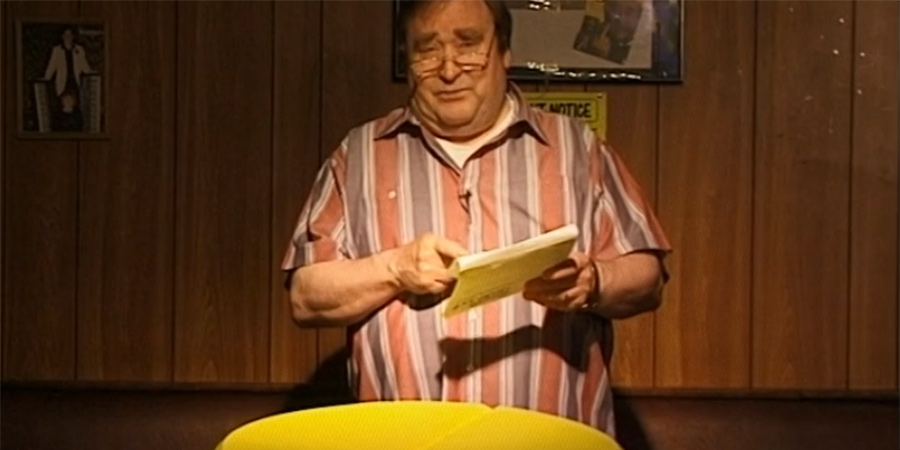
The then much-loved artist and entertainer, Rolf Harris. DJ Bruno Brookes. Footballing legend, Jimmy Greaves. Lady Thatcher's press secretary, Sir Bernard Ingham. Undeterred by the fact the drug in question appeared to be a plate-sized yellow disc which looked like no drug ever seen before on Earth, all were prepared to go on TV and use ridiculous language to denounce a new social menace which they were clearly totally ignorant of and which, of course (as viewers clearly recognised), did not exist.
Tory MP David Amess went further than creator Chris Morris had even imagined, not only spouting sentences like "Look at that! One hundred grand in the pocket of the filth that sells it. A big yellow death bullet in the head of some poor user, or 'custard gannet', as the dealers call them", he even agreeing to ask a question about the issue in the House of Commons.
The programme, of course, was Brass Eye and it was not a factual news programme but a new hard-hitting comedy satire. Cake had, in fact, been entirely made-up by the show's creator, Chris Morris.
Today, the Cake prank is probably the most widely remembered feature of the six episodes. Despite the widespread publicity the sequence generated, despite the damage it did to the reputations of everyone who had been duped, four years later, Morris pulled off a similar perhaps even more spectacular stunt: The 2001 Brass Eye Paedogeddon! special.
This standalone episode included a sequence in which a different group of publicity-hungry celebs embarrassed themselves by condemning a fantastically implausible computer game they had been told was being used by paedophiles to ensnare children via a cartoon dog called 'Pantou'. Famous names such as respected as Tomorrow's World presenter Philippa Forrester and newsreader Nicholas Owen were seen mindlessly condemning any games which used a "Hidden Online Entrapment Control System", or HOECS. In other words, these were 'HOECS' (hoax) games. "Let's put a bomb under Pantou's chin and stamp on his throat" Owen, a respected broadcaster, said. "Let's rip this dog's brains out."
Gary Lineker, meanwhile, was happy to hold up a picture of a hillside, featuring what he said was a tiny image of a child in the far distance. "If you attempt to show this to a paedophile", Lineker explained, "he will try and attack it in an attempt to get to the child."
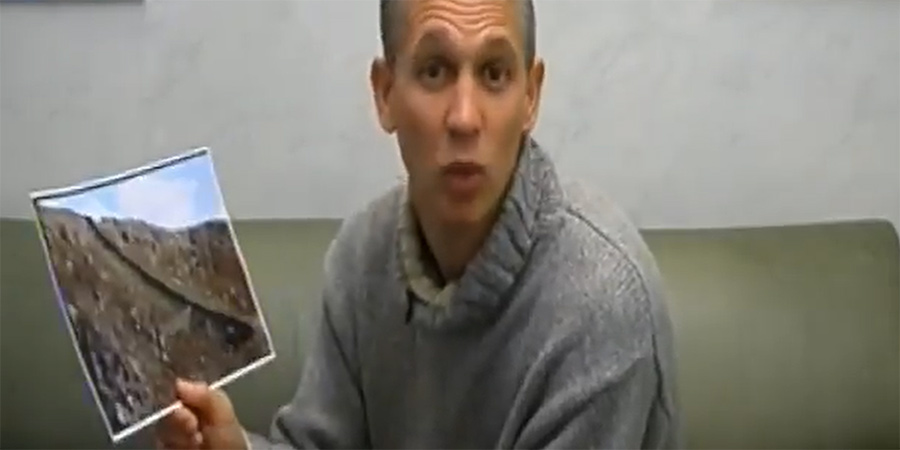
In some cases, the credibility of those involved - the list which includes athlete and former MP Sebastian Coe and politician Barbara Follett - has never entirely recovered.
Portsmouth MP Syd Rapston claimed that the paedophiles were using "an area of internet the size of Ireland." Presenter Kate Thornton related how one child was trapped online for a whole night and, according to one psychologist, "came away with the listless sexual appetite of a 60-year-old colonel."
DJ Neil 'Dr' Fox has never got over the footage of him stating "Genetically, paedophiles have more genes in common with crabs than they do with you and me. Now that is scientific fact... there's no real evidence for it, but it is scientific fact."
All were as happy to be seen saying this as music legend Phil Collins endorsed a non-existent charity. The footage of Collins stating "I'm talking Nonce Sense" will doubtless follow him to his grave.
There was more to Brass Eye than duping celebrities however. Twenty-five years later, the show remains a landmark in the annals of British comedy. Against all odds, the six episodes and the one-off special remain just as fresh, funny, incisive and shocking as they did at the time. In some cases, perhaps more so.
Slamming the wasps from the pure apple of truth
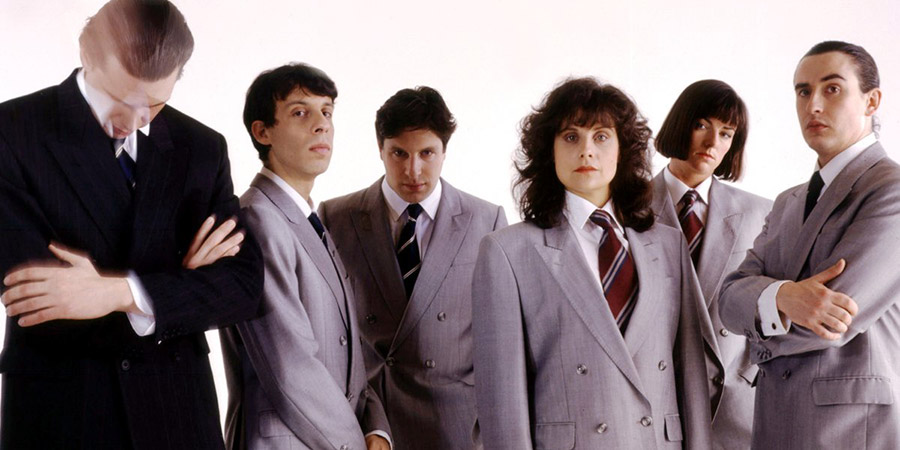
Brass Eye had originally been conceived as a sequel to the BBC's The Day Today (1994) which was itself a TV version of Radio 4's On The Hour (1991-92). Although perhaps best remembered now as the shows which introduced the world to Steve Coogan's great comedy creation, Alan Partridge, it was On The Hour and The Day Today which also first unleashed the aggressive, arrogant Jeremy Paxman-like news frontman persona, Chris Morris, onto the world. It was a character he would continue to use and develop further on Brass Eye.
The idea behind both programmes was to satirise every aspect of late 20th century news presentation. The Day Today did this particularly effectively taking the form of a Newsnight-style current affairs programme.
There were over-the-top and overlong title sequences and graphics sequences (a feature Brass Eye would eventually push to new, often deliberately tedious, extremes). There were silly soundbites: "The Day Today: because fact into doubt won't go." There were silly headlines: "Portillo's teeth removed to boost pound...", "NATO annulled after delegate swallows treaty...", "Headmaster suspended for using big-faced child as satellite dish..."
There were silly stories: "Just to let you know the police are still looking for the actor Burt Reynolds, after he stole a dodgem and drove it out of a fairground in Islington." There was hard financial news: "As City markets crashed and flew off, the government tried to stabilise the economy with an emergency currency based on the Queen's eggs, several thousand of which were removed from her ovaries in 1953 and held in reserve. " There were over-earnest newsreaders: "Those were the headlines... God, I wish they weren't."
In addition to emulating Newsnight's famously adversarial Paxman, Morris (and others such as Patrick Marber) would also mock the overly sombre nuances occasionally detectable in the speech of Michael Buerk or the surprisingly aggressive welcomes given to viewers and listeners by the likes of John Humphreys and the late Peter Sissons.
There were hyperbolic assertions from 'experts': "If you have any history books at home, throw them away! They're worthless!" There was palpable tension between the presenters: Morris's character cannot bear to look at business expert, Collaterly Sisters (Doon Mackichan) and he endlessly torments Alan Partridge, at one point throwing a football at him on air. He mercilessly bullies the admittedly incompetent Peter O'Hanraha-hanrahan (Patrick Marber) too, but clearly has a soft spot for travel correspondent Valerie Sinatra (Rebecca Front).
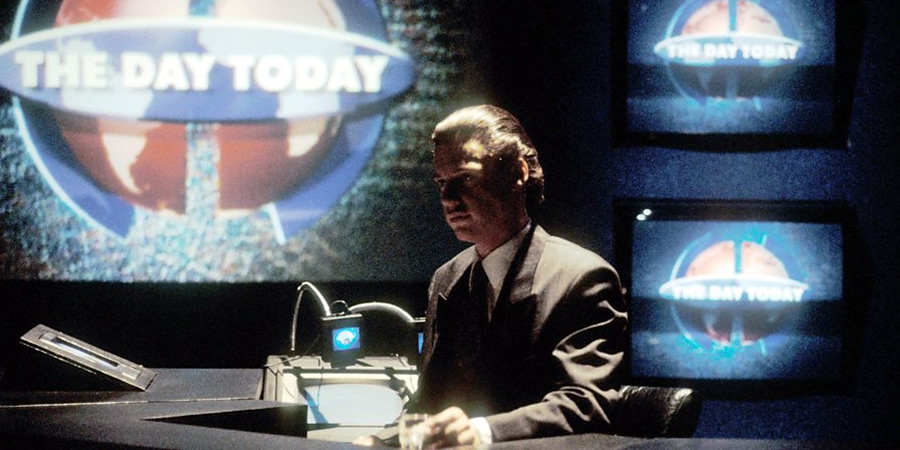
There were needlessly rude interviews, with Morris's character deliberately reducing well-meaning jam-festival organiser Janet Breen to tears by stating: "How dare you come on this programme and say 'Hey look at me, I'm raising fifteen hundred pounds for the homeless'!? You could make more money sitting outside a tube station with your hat on the ground, even if you were twice as ugly as you are, which is very ugly indeed!"
The voices of newsreaders and even the patterns of their speech were mocked. Pot-shots were even fired at wider targets too, ranging from trigger-happy US rap artists, racist 1970s sitcoms (Them Next Door), US grunge musicians (Morris played a Kurt Cobain-like musician adapting his music to advertise women's sanitary products) and TV soaps (The Bureau).
The Day Today marked the end of Chris Morris's collaboration with producer Armando Iannucci, Steve Coogan and most of The Day Today team, although they remained on friendly terms.
In 1997 (after Brass Eye had aired) Morris would make an appearance as "big posh sod" Peter Baxendale Thomas in I'm Alan Partridge, a character who prompts Alan to memorably offload all of his prejudices about farmers in one go:
"If you see a lovely field with a family having a picnic, and a nice pond in it, you fill in the pond with concrete, you plough the family into the soil, you blow up the tree, and use the leaves to make a dress for your wife who is also your brother."
But, for the most part, Morris would go his own way after The Day Today.
Brass tacks
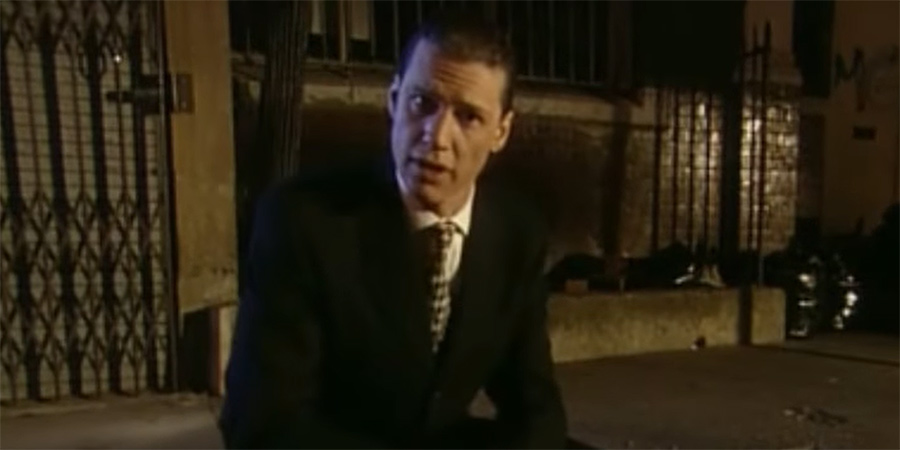
It was not hard to spot members of The Day Today cast in the mid-1990s, after the show had finished. Steve Coogan, in particular, was transformed into a household name during this period, largely as a result of Alan Partridge and to a lesser extent, his other characters, Paul and Pauline Calf. Partridge was regularly joined by other Day Today alumni on the sofa, such as Rebecca Front, Doon Mackichan, David Schneider and Patrick Marber. Armando Iannucci was as heavily involved in Partridge as he had been The Day Today and also joined other ex-Day Today alumni for The Saturday Night Armistice (later The Friday Night Armistice). Marber, while in the process of becoming a successful playwright, also joined the cast of Paul Calf's Three Fights, Two Weddings and A Funeral. Meanwhile, On The Hour writers Stewart Lee and Richard Herring got their own show, Fist Of Fun, and David Schneider cropped up in various projects, such as playing an anxious British train driver in the first Mission Impossible film. And so on.
Chris Morris, as so often, plotted a different course though. Despite having been the most visible screen presence on The Day Today, he maintained a low profile in the three years after it aired as he worked to get his new project - initially called Torque TV, but eventually Brass Eye - off the ground.
The new name was formed from two past public affairs shows, Brass Tacks and Public Eye. Morris's low profile worked in his favour, enabling him to later trap celebrities in way which would have been impossible had he been as well-known as Steve Coogan was by then.
The central idea behind Brass Eye was a clearly a bit more than just The Day Today II. Instead of a news format, the new series would explore six topics: Animals, Drugs, Science, Sex, Crime and Decline, deliberately adopting the self-important tone of any documentary which can easily dispense with such massive topics in the space of one short programme.
Despite having commissioned The Day Today, BBC Two's youthful controller (and non-pop star), Michael Jackson backed away from commissioning the new series, and Brass Eye was thus instead snatched up by Channel 4.
Although he had parted company with most of The Day Today team (Doon Mackichan being a notable exception), Morris was not, of course, working alone. Writing support came from, amongst others, Peter Baynham, Graham Lineham, Arthur Mathews and Morris's future Nathan Barley collaborator, Charlie Brooker.
Talented performers now working alongside him included rising stars Kevin Eldon, Mark Heap (notably as the AIDS sufferer who Morris's host accuses of having "bad AIDS") and Claire Skinner (later of the sitcom Outnumbered), as well as Gina McKee fresh from her serious dramatic role in the major BBC drama Our Friends In The North.
Watching the series back, you can also see small roles for rising stars Alexander Armstrong, Bill Bailey, Simon Pegg and Julia Davis.
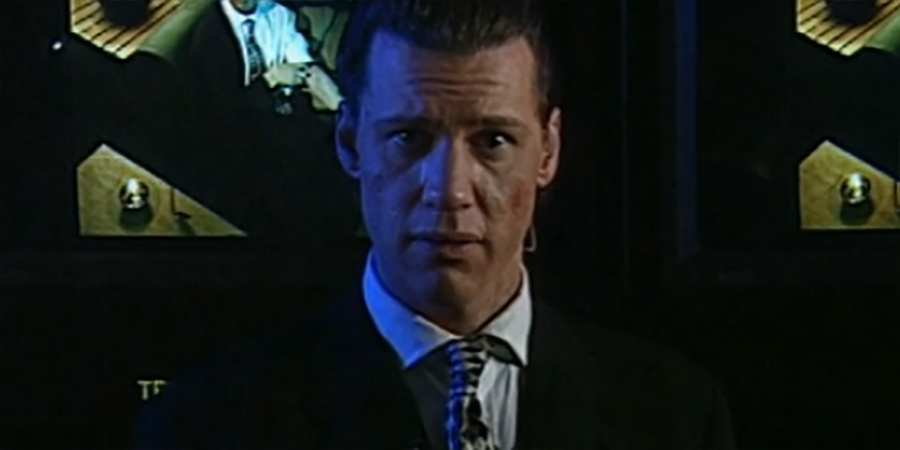
Frequent Morris collaborator David Cann also made an impact as the headmaster in a pitch perfect film supposedly an extract from a 1970s documentary about the fictional Drumlake School (a parody of A.S. Neill's Summerhill School) where drug use was freely tolerated.
First appearing, after some delay, in January 1997, the first episode, Animals, attracted relatively little attention and about one million viewers. The show received a mixed response on BBC Two's The Late Review with Germaine Greer and Howard Jacobson generally enthusing about it, while a confused Tony Parsons seemed unable to decide whether to admit that he'd enjoyed it or to dismiss it ("we've seen it all before").
The second episode, Drugs, created a sensation though - largely because of the Cake ruse. But it is a remarkably strong episode anyway with Morris risking his own safety at one point by antagonising real-life coke dealers and confusing them by using non-existent drug slang ("Have you got any triple sod?... Yellow bentines?... I tell you what, I'll give you 30 quid for one clarky cat").
The episode also sees Morris attending a reconstruction of a modern 'drugs party' ("oh look! There's someone smoking a crack!") and a graphic briefly turns his head into a hypodermic needle. Later, Morris highlights the hypocrisy of late 20th century attitudes to drugs. "Luckily, the amount of heroin I use is harmless," he concludes. "I inject about once a month on a purely recreational basis. Fine. But what about other people less stable, less educated, less middle-class than me? Builders or blacks for example. If you're one of those, my advice is leave well alone!"
Yet it was the Cake prank which generated headlines. It was very nearly not shown at all, and was the reason the series was postponed from its original 1996 launch date. Channel 4 raised concerns about the footage featuring MPs. Executive Michael Grade pressured Morris to get permission from Amess and fellow Tory MP Graham Bright to air the film, or it would be cut. Morris refused to do this and refused to budge on the issue. In the end, the series was aired in early 1997 with the Cake sequence included, but the sequences featuring Bright and a skit about a musical based on the Yorkshire Ripper were cut. Morris was not happy and included a one frame subliminal message ("Grade Is A C-------") during the screening of the final episode, as revenge. Grade announced his resignation as head of Channel 4 during the week of Brass Eye's first appearance on the screen.
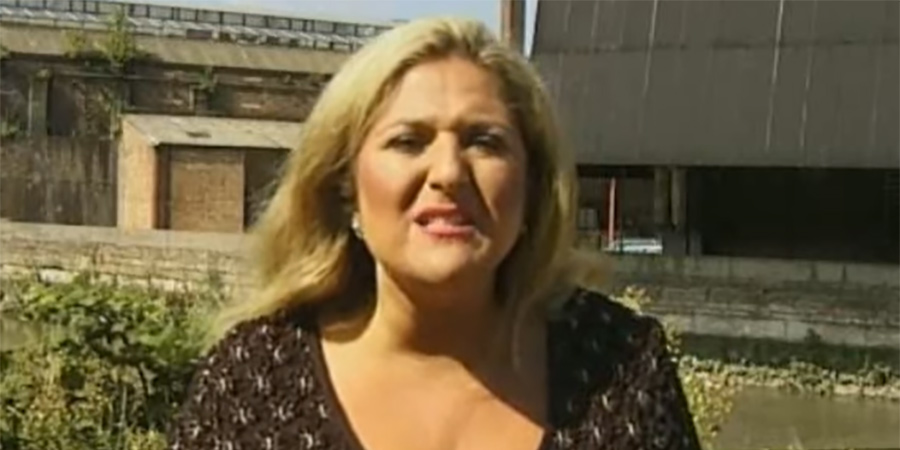
In the Crime episode, another notable celebrity was tripped up when Vanessa Feltz agreed to record a bizarrely scripted message supposedly intended to force convicted criminals to confront the implications of their actions. "Hello, you think you don't know me, don't you?" she began. "Yes, but you do because I'm the shopkeeper you shot in a mindless hold-up; you blew out my guts, remember? I'm the old lady whose head you stove in with a loose wardrobe in the middle of the night, remember? I'm the little boy whose face you stabbed off in panic when I found you robbing my house, remember? I'm Marvin Gaye, shot by my own father - oh, yes, you know me all right."
Meanwhile the final episode saw Noel Edmonds once again acting as the target of Brass Eye's satirical fire, in the form of a bogus news report claiming the writer and broadcaster Clive Anderson had been assassinated by Edmonds. Although an incredibly far-fetched report, which featured Gina McKee sporting a full moustache and supposed footage of a bare-chested Edmonds firing a rocket launcher from his roof, the prank fooled some viewers.
Hello, you've reached the news desk...
This is not really the place for a detailed reconstruction of the various arguments that have raged for and against Brass Eye, both at the time, and in the years since. But no one reading this will need to be reminded that it was controversial. The 2001 Paedogeddon Special attracted 3,000 complaints alone.
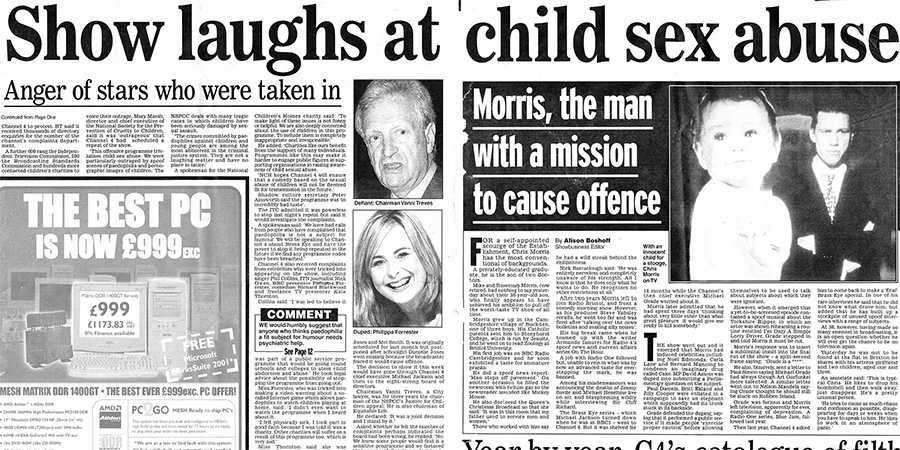
Particular concerns surrounding the frequent use of children in images throughout the special were to some extent dispelled by the revelation that all the pictures were of the show's own crew taken when they were young and who had, of course, supplied the pictures voluntarily as adults.
In addition to the computer game prank, memorable sequences include reporter Ted Maul (played by Morris) providing an account of an outbreak of mob violence: "Tonight, one man kebabbed, thousands scarred forever by a shared blood ritual. And yet, an astonishing sense of community here now, a positive atmosphere, a sense of a job well done, a shared sense of relief."
Later, Morris's presenter challenges militant paedophile Gerald Chote (played by Simon Pegg) to admit he wants to have sex with his "son" who he produces on air. "I don't find him attractive, I'm sorry," he admits to the presenter's clear embarrassment.
Much of the media reaction was fierce and often hypocritical. An article attacking Morris in The Daily Star appeared opposite a piece commenting on the developing bust of singing star Charlotte Church, then just fifteen years-old.
Acting totally irresponsibly, one tabloid even published Morris's home phone number, presumably to enable enraged viewers to register their disapproval with Morris in person. Acting quickly, Morris cleverly recorded an answerphone message which would give unwanted callers the impression that they had in fact called the newspaper's own switchboard in error:
"Hello, you've reached the news desk. Please leave your message at the tone."
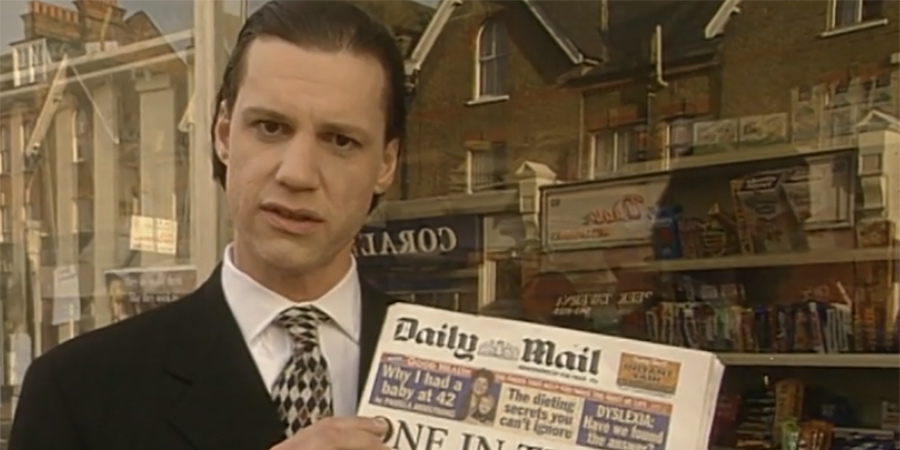
Never entirely at ease as a TV performer, in the years since Morris has often been happier off camera whether on his own shows Jam and Blue Jam or as the film director behind Four Lions and The Day Shall Come.
A notable exception to this was his role as the eccentric Denholm Reynholm, the managing director in Channel 4 sitcom The IT Crowd between 2006 and 2007. Morris appeared in just two series of the sitcom before leaving, ultimately being succeeded by the up-and-coming Matt Berry who took on the role of Denholm's immature and womanising son, Douglas. The IT Crowd represents Morris's most significant acting role of the 21st century thus far.
As he approaches his 60th birthday, it is likely most of us could pass Chris Morris in the street without recognising him. Yet his work has inspired a popular online comedy forum, Cook'd and Bomb'd, and he remains one of the most admired and respected figures in British comedy today.
Twenty-five years on
Few, if any, satires remain cutting edge a full quarter century after they first appear. Even the most ground-breaking shows almost invariably see their edge blunted by time. The likes of That Was The Week That Was, which was so bold and daring in 1963, inevitably looked tame indeed when revisited in 1988. How could it possibly have been otherwise in the age of alternative comedy, Spitting Image and Viz? Likewise, it's hard to imagine the comedy fans of 2047 will still be having their assumptions challenged by episodes of Have I Got News For You or Mock The Week from 2022.
That is not to say nothing over 25 years-old can ever still seem funny. Far from it. But, usually, the element of danger is lost over time.
Brass Eye is definitely an exception to this rule.
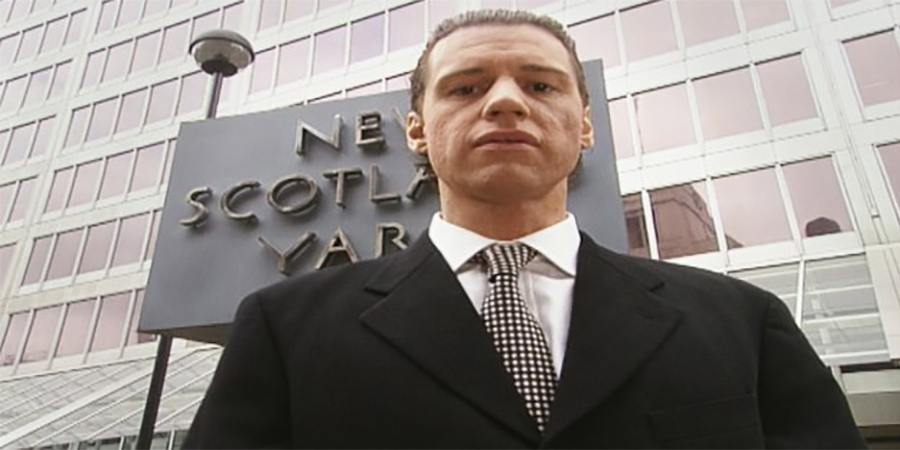
It is true our perceptions of some of the well-known figures featured have changed in the years since. Some of Morris's targets - such as Bernard Manning, Darcus Howe, Jimmy Greaves, Claire Rayner and Richard Briers - have now died. Other victims of the show, such as Babylon Zoo's Jas Mann and Robot Wars co-presenter Philippa Forrester are much less famous now than they were then. Far less predictable, however, was the dramatic fall from grace of Rolf Harris. The brutal murder of MP David Amess in his constituency in 2021 also now adds a sombre footnote to his memorable appearance in the series.
First broadcast on Channel 4, between January and March 1997, Brass Eye not only remains funny 25 years on but still seems remarkably edgy and dangerous. Given all that has happened since, it seems incredible it was ever shown at all. It is harder still to imagine it being commissioned now, certainly on a mainstream network like Channel 4.
One of the secrets of Brass Eye's relative sense of timelessness was that little of the content was specifically topical. It was broadcast at a politically sensitive time: the final episode of the original series was aired just 12 days before John Major formally announced the date of the long anticipated 1997 General Election, a campaign which would see him and his party swept from office in what remains the biggest electoral deluge of the last eighty years. A wealth of party political content on a TV comedy show would have been difficult to broadcast in such an environment. But it also partly explains why the Brass Eye series - although a relic from a time before the Iraq War, digital TV and the premiership of Tony Blair, aired weeks before the launch of Channel 5 and months before the death of Princess Diana - still somehow seems so timely.
Most Britons had never used the internet in the first months of 1997. Only around a fifth of the population owned a mobile phone. Nearly every household owned a VHS video recorder (almost no one does now of course). Brass Eye is a product of this vanished era. Yet against all odds, 25 years on, it still feels remarkably fresh.
Ultimately, Brass Eye might just be one of the greatest British comedies ever made. There's no real evidence for it, but it is a scientific fact.
Just as programmers were wary about commissioning Brass Eye in the first place, it was also slow to arrive on DVD, finally being released in 2007. Those unable to remember what DVDs are can watch all seven episodes for free via All4
Help us publish more great content by becoming a BCG Supporter. You'll be backing our mission to champion, celebrate and promote British comedy in all its forms: past, present and future.
We understand times are tough, but if you believe in the power of laughter we'd be honoured to have you join us. Advertising doesn't cover our costs, so every single donation matters and is put to good use. Thank you.
Love comedy? Find out more

